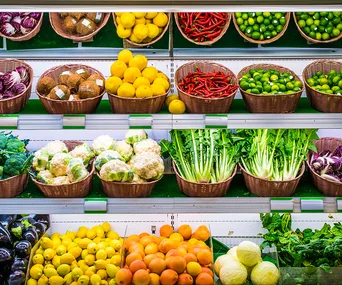The argument for a more organic life is compelling, yet bears repeating for those yet to make the leap.
Research reveals more than 50 per cent of Australians buy organic produce, and two-thirds of those people do so because of health concerns.
Up to 80 per cent of food is sprayed with herbicides and pesticides, and contains hormones and antibiotics.
“The World Health Organisation is telling us these chemicals live in our body,” says Dr John Tickell, who studies health and longevity around the world, and is a Saba Organics ambassador.
“They don’t just leave after 30 minutes. They build up and get stored in our fatty tissue – a process called bioaccumulation.”
The only way we can know what is in our food, he says, is to buy certified organic produce – which in turn also helps the planet by reducing pollution and soil erosion, conserving water and creating more biodiversity.
Start with staples

Studies have shown that organic fruits and vegetables are richer in nutrients than conventional produce.
(Pexels)Replace some of your grocery or personal care items with organic alternatives.”People think they need to be in or out,” says Australian Organic Limited’s CEO, Niki Ford.
“Just start with one or two things you regularly buy, and go from there.”
The good news is that you’ll get more nutrients into your body without entirely changing your habits. Studies have shown that organic fruits and vegetables are richer in nutrients than conventional produce.
One study from England’s Newcastle University found that organic produce has up to 40 per cent higher levels of vitamin C, zinc, iron and other key nutrients, while scientists from the University of Florida found that organically grown produce has a concentration of cancer-fighting phytonutrients up to 25 per cent higher than its conventional counterparts.
Keep your eyes open

‘Greenwashing’ has always been a problem with organic produce.
(Pexels)‘Greenwashing’ has always been a problem with organic produce.
“Right now, companies can use the word organic in their brand names and on the labels, even if they have little to no organic ingredients in them,” says Niki, who notes this is an issue before parliament at the moment.
In the meantime, the certification that experts trust is the Australian Certified Organic (ACO) bud, which means a product is free from human-made fertilisers, pesticides, growth regulators and GMOs.
“This takes years to get after going through an extensive audit, so when you see it, you can trust a product is entirely organic,” says Dr Tickell.
Under your skin
“The biggest organ in the human body is our skin, and it acts as a protector but also as a sponge,” says Dr Tickell.
The beauty industry can be hard to navigate when you only want to put natural formulas on your skin.
‘Clean beauty’ brands are usually formulated without ingredients linked to harmful health effects, such as parabens, phthalates and synthetic fragrances.
But if you want something entirely organic, look for ACO accreditation or small-batch makers who make simple formulas with recognisable ingredients.
Shop these beauty swaps:

Saba Organics is an ACO-certified brand, so you know it’s organic. Hand Sanitiser Gel with Rose & Kakadu Plum, $19.95, Saba Organics.
(Saba Organics)
B Corp brands such as Ethique meet stringent standards in environmental and social impact. Quench Solid Face Cream, $45, Ethique.
(Ethique)
Look for brands suchas Clover Fields with sustainable ingredients you recognise. The O.G. Bar, $16, Clover Fields.
(Clover Fields)You do you

Organic anything used to be priced as a luxury – not anymore.
(Pexels)Organic anything used to be priced as a luxury, but as demand has grown, prices have dropped.
“The difference between canned tomatoes that were organic and non-organic used to be a few dollars,” says Niki.
“Now it’s about 40 cents. That is happening because more people are choosing organic.”
Still, few of us have the time or budget to maintain 100 per cent organic and local diets. The message is: don’t sweat it.
“There will always be choices, but if you are safer on a day-to-day basis, your chances of living a longer and healthier life are greater,” says Dr Tickell.
“As a brain cancer survivor, I have learnt that every little bit of goodness tips the odds of a long, healthy life in your favour.”
Follow the seasons

Ask farmers and makers about their growing practices.
(Pexels)Reconnecting with in-season foods is a great way to embrace organic. Ask farmers and makers about their growing practices.
“When I switched to organic, I started with an organic produce delivery service,” says Niki.
“I learned what was in season and how to prepare it, and started eating a wider variety of fruit and vegetables.”
Interestingly, as our demand for organic produce grows, supermarkets have had to help farmers transition to organic farming.
“Consumers have the power now,” says Niki. “When you buy organic, retailers need to keep stocking shelves, creating positive change.”
In fact, one of our largest chains invested $30 million in helping local farmers transition to organic farming. “People want to know exactly what they are putting in their bodies,” says Niki.
Read this story and more in the December issue of The Australian Women’s Weekly – on sale now.



